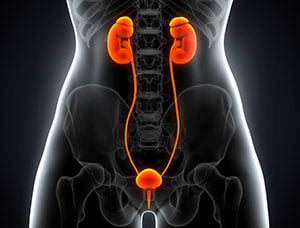A urinary tract infection (UTI) is an infection of the bladder or kidneys. UTI’s are more common in women than men and can involve various bacteria. Bacteria can enter through the urethra and travel up to the bladder causing cystitis or bladder infection. If it travels further up through the ureters, it can then lead to a kidney infection or pyelonephritis. In men, bladder infections may affect the prostate gland, leading to prostatitis.

Urinary tract infections are one of the most common bacterial infections. In a previous National Ambulatory Medical Care Survey, UTI’s accounted for nearly 1 million emergency room visits and 7 million office visits. Almost half of all women experience a UTI in their lifetime.1
Symptoms of UTIs include:
If the infection involves the kidneys, symptoms may include fever, back pain, nausea, and vomiting.
Risk factors of UTIs include:
Lifestyle and behavioral factors do have an influence on bladder health.2 Poor nutrition that impairs the immune system, causes inflammation, and disrupts the beneficial flora of the gut also contributes to recurrent UTIs.3 Washing well with water after a bowel movement to remove any film of bacteria from feces on the skin is helpful to prevent future infections.
ONLINE: All members of DrFuhrman.com can search the Ask the Doctor archives for discussions on this topic. Platinum and Diamond members can connect with Dr. Fuhrman by posting questions in the forum. Not a member? Join now.
IN PERSON: Book a stay at Dr. Fuhrman’s Eat to Live Retreat in San Diego, California. With options ranging from one, two and three months (and sometimes longer) you will be under Dr. Fuhrman’s direct medical supervision as you hit the “reset” button on your health. For more information: (949) 432-6295 or [email protected].
EVENTS: Join Dr. Fuhrman for an online boot camp, detox or other event. During these immersive online events, you’ll attend zoom lectures, follow a special meal plan, and have access to a special, live Q&A session with Dr. Fuhrman. Learn more about events.
The following are sample questions from the Ask the Doctor Community Platinum and higher members can post their health questions directly to Dr. Fuhrman. (All members can browse questions and answers.)
My five year old daughter never had trouble with UTIs until about six months ago. Out of the blue she started complaining about it hurting when she went potty. Within two hours, she had a high fever, was urinating frequently (several times an hour), and would scream and writhe while on the toilet. I took her to the doctor the next day and she tested positive for bacteria in her urine and was given amoxicillin. After three days she was no better, and her doctor prescribed a different, stronger antibiotic. It finally disappeared after two weeks. But since then she has had round after round of UTIs, followed by a yeast infection (from the antibiotics, no doubt) and another UTI. I don’t want to give her antibiotics anymore, but when she screams and cries all day long from the pain I don’t know what else can "fix it." I know there must be an underlying problem, but we don’t know what it is or how to treat it.
Pure cranberry juice or cranberry extract daily, as well as D-mannose may help prevent or even treat a UTI early on. Since she is getting frequent UTIs, of course, you’ll need to evaluate whether it is a hygiene issue (her not wiping correctly), which is the most common cause at her age, or if there is any anatomical issues with her urinary tract that might be contributing to her heightened risk of infection. If this had not been evaluated already, she needs to get those tests done, starting with a renal ultrasound. Make sure that she is taking probiotics for at least a few months because of her recent antibiotic use.
I have been getting urinary tract infections off and on for the past year. I am currently on an antibiotic for 10 days. Would either of the following supplements help if I took them on a daily basis for urinary tract health and prevention: Cran-actin and/or d-mannose?
If you are having frequent urinary tract infections, you need to wash your bottom with soap and water after every bowel movement and after sexual activity, too. That is more important than using the supplements. Second, 10 days of antibiotics are not needed for a UTI, usually three to six days is sufficient, and 10 days could increase risk to your digestive tract. If you are not eating a high nutrient, Nutritarian diet, do not delay.
D-mannose and cranberry juice tabs twice daily can help prevent future infection, and some people even respond to them effectively when they have an infection (which requires increased dosages and frequency of use), but if not responding within 36 hours, begin antibiotics. Take them continually, two tabs of each every two hours, while awake.
If taking on a daily basis just use one tab of each twice a day.
I have a urinary tract infection confirmed by a home test eight days ago. I have been taking D-Mannose. It has improved but not resolved. Is it ok to keep using the D-Mannose, or do I need to take the antibiotics?
In addition to eating perfectly and D-mannose, taking a few cranberry tablets five times a day could also be useful. To answer your question, the severity of the infection and the degree of improvement to this point has to be considered. If you have no fever and it has improved significantly, perhaps a urine culture that measures the severity at this point would be helpful.

Kimberly lost 60 pounds and no longer suffers with eczema; her mom lost 142 pounds and is free of diabetes and monthly urinary tract infections... Read More
Results may vary.
The Nutritarian diet helped control Stephanie's gestational diabetes and she no longer suffers frequent urinary tract infections... Read More
Results may vary.